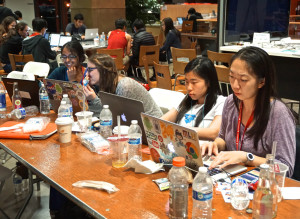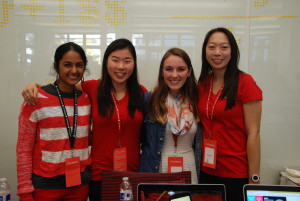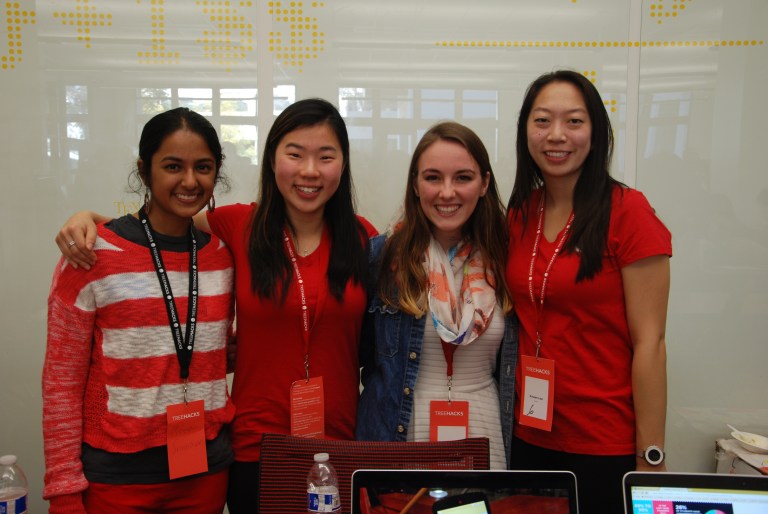Team Sm:)e was an all-female team at TreeHacks that “kind of just happened organically” — they hadn’t planned on being a team of all women in advance.
Kristen Law ’18, Gracie Young ’18 and Catherina Xu ’18 were all sophomores who had worked together at previous hackathons and for class projects, and Meera Srinivasan ’19 was a freshman intern with the Stanford Women in Computer Science group (WICS), of which Young and Xu are also members. Young and Xu were also coordinating WICS annual hackathon for 2016. Coincidentally, Law and Young had first met at a NASA women-in-tech event as high schoolers.
The team explained that they felt the community of women studying computer science at Stanford was large enough for the all-female team to form naturally. TreeHacks 2015 had been Gracie’s first hackathon, and this year’s event was Meera’s first.
“This time we aren’t as intense in terms of no sleep, no whatever, but I think we all appreciate that it’s pretty different,” Xu said on Saturday afternoon.
The group was working on a mobile application to track users’ mental health by analyzing their text messages. They had started off knowing that they wanted to create an Android app and had been inspired by TreeHacks’s health theme. Having slept by 1:15 a.m. on Friday night, the group had agreed to keep plans flexible and non-competitive.
“For Stanford it’s really open,” Xu added. “You can come; you can not come… And it’s awesome how they have activities and stuff instead of just sitting all day and coding all day. It’s pretty fun to get up and move.”
But despite wanting a less “intense” hackathon experience at TreeHacks, Team Sm:)e ended up staying awake for most of Saturday night and Sunday morning.

By midnight on Sunday, they had been sitting at the same table and staring at the same computer screens for over 12 hours. Srinivasan had spent a large portion of that time integrating Windows Media Player into their project to play music, but she had encountered an issue, or “bug,” when trying to open the audio files.
Young was trying to help Srinivasan debug the problem, but by nearly 2:30 a.m., the lack of sleep was catching up with the team.
“Meera, I can’t help you anymore,” Young said. “I believe in you, and I believe that you can fix this but … What’s the econ term my mom always uses?”
“Cost-benefit analysis?” someone suggested jokingly.
Young found the phrase for which she was looking: “This is a pivot point! But it doesn’t mean that the last twelve hours have gone to waste.”
Srinivasan paused and looked Young directly in the eyes.
“That was inspirational,” Srinivasan said genuinely.
The team broke into laughter.
“A 360-degree pivot point!” Young added. “Wait. That would end up in the same direction.”
This time, hackers who overhead the conversation from a nearby table joined in the laughter.
Around 3 a.m., another TreeHacks participant helped Srinivasan fix the problem, and without having been there, it would have been hard to imagine how excited someone could get over a song playing on a phone. Young had a similar rush when she successfully made a photo transition off the phone screen. By 3:30 a.m., Team Sm:)e had hit another wave of energy and were actively discussing different operating systems and APIs.
Empty coffee cups and boba cups were scattered around their laptops, and Law had brought a bag of Snapea Crisps upstairs to keep the team nourished as they worked. Productive moments for the team came and went in surges — one moment they’d make a coding breakthrough and the next they’d be laughing about how Young had misspelled “splash” as “spash” and was too lazy to change the filename.
“I’ve passed the point of no return,” Young said at 5:35 a.m.
At 4:30 a.m., they had promised to leave by 6 a.m., but at 7 a.m., all four members were still sitting at the table. They were laughing deliriously as they filmed a promo video to post with their project submission.
“Hackathon projects don’t even usually get this done, so snaps to us,” Young said.
Xu rested her chin on her keyboard: “I’m just going to smile from my little laptop of a bed.”
At 7:11 a.m., their app was finally live on TreeHacks’s submission site. They debated whether or not they should even go to bed but ultimately decided to get some rest before the final project expo at 12 p.m.

Later that day, the team presented for over two hours as judges came and went from their table. Their lack of sleep hardly showed.
“It’s really thrilling and almost addicting,” Young said. “I kind of thought that I was going to do the hackathon really chill, maybe go for a couple of hours, work on CS 110 [homework], but I think once you start, you get so excited about your idea, and you just want to see it come to life that you don’t even care how long you sleep. You just want to finish the project.”
And even though they didn’t end up winning any prizes, Team Sm:)e was happy with the final outcome of their project.
“I think the thing we’re most proud of is how it came together,” Xu said.
“When I usually go to a hackathon, there’s at least six hours of work that I do that goes to nothing because I end up not being able to make it work,” Young added. “But everything that we worked on, we got it to the end, and we got it to the final product. That’s a really big accomplishment.”
Contact Kylie Jue at kyliej ‘at’ stanford.edu.
